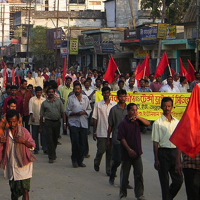In July 1967, at the height of Mao Zedong's "Great Proletarian Cultural Revolution," an editorial appeared in the Chinese Communist Party newspaper the People's Daily heralding "a peel of spring thunder" sweeping across India.
An uprising of tea-plantation workers led by Maoist militants in Naxalbari, a poor and remote district near India's Darjeeling region, had come to Beijing's attention. Inspired by the Chinese revolution, the militants imagined that Naxalbari was to be the beginning of a popular revolt that would end with the red flag flying over New Delhi.
Such dreams were premature. Within months, the government had brutally suppressed the uprising, with most of its leaders ending up either killed or imprisoned. Naxalbari seemed likely to become little more than a footnote in India's long history of small rural revolts.

